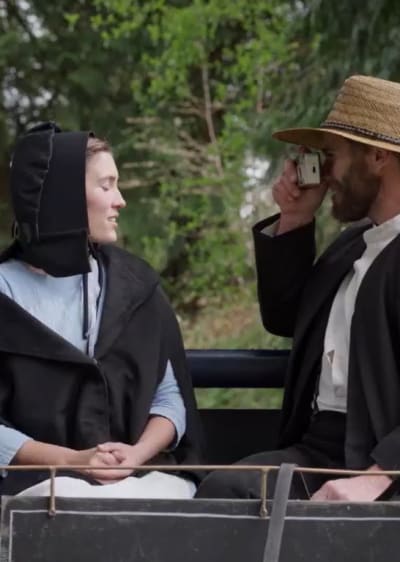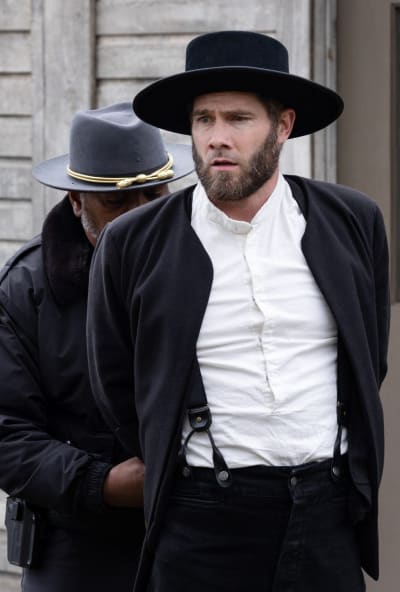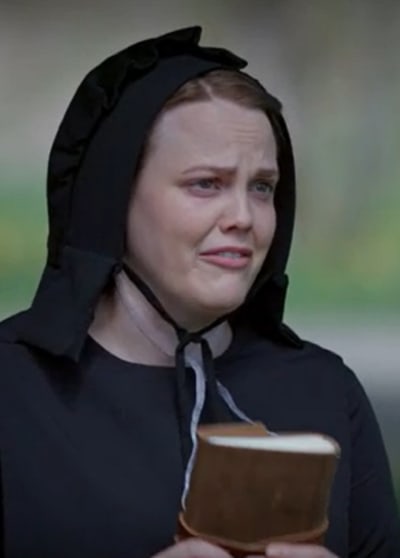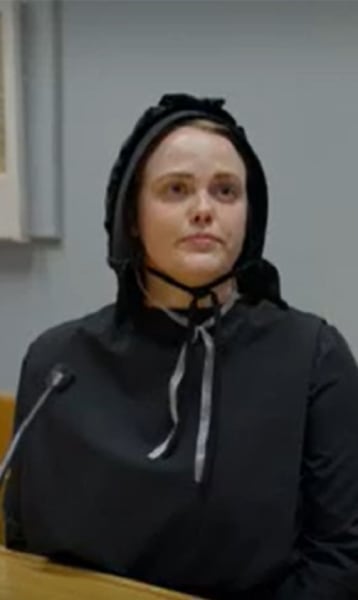Lifetime delivers a positively scintillating tale with this true crime drama.
Not only has Luke Macfarlane, notable Hallmark Heartthrob, switched networks starring and serving as an executive producer in Amish Stud: The Eli Weaver Story, but he transforms into something unrecognizable, embodying Weaver.
If there was even for a second an iota of doubt about Macfarlane’s range as an actor, one needn’t look any further than his chilling and nauseating performance of an individual one can only describe as a manipulative monster.
The strength in this film, and there are many things worthy of accolades, is in Macfarlane’s performance.
He becomes this whole other person at the drop of a dime, fully capturing that of the narcissistic and sociopathic Eli Weaver in all of his notoriety.
One thing that comes through crystal clear is how charismatic, manipulative, cunning, selfish, and apathetic this man is. It’s appalling to see Eli in action from the start of the film to the very end.
If the God he pretends to worship bestowed upon him any “gifts,” he can charm and manipulate people into doing whatever he pleases. It hardly seems plausible that one man could have the type of pull that Eli has, yet history tells a different story and reminds us regularly of this undeniable truth.
Throughout this tale, one couldn’t help but often wonder why exactly Eli chose to continue with his Amish faith and way of life when it’s the antithesis of everything he wants out of life.
The more time we spend with him, the more apparent it is that this man is a sociopath who isn’t capable of caring or loving anyone but himself, not truly, thoroughly, and deeply.
Everything about his life is a carefully crafted facade to serve his selfish desires.
Eli could have taken his Rumspringa, chose an English life, and never returned to the claustrophic Amish lifestyle he felt held him back.
But perhaps it was a control thing. Eli must’ve wanted the best of both of these worlds, as we know without a shadow of a doubt that he would’ve been a menace that succame to his own misguided mechanizations if he spent too much time in the English world.
While it’s not as if he wouldn’t have succeeded at charming and manipulating his way into a lifestyle that suited him in the English world, making it work to his advantage, perhaps he simply didn’t want to do that much work.
Or, as we could see at times, maybe he was prone to flightiness and the attention span of a gnat, desiring something for a short period while it holds his attention before he quickly moves onto a new challenge and something fresh and new.
Eli seemingly spent his entire adult life with one foot out of the Amish and Mennonite world, making it seem as if what is meant to be a culture, religion, and way of life was a costume he put on more than anything else.
While it’s clear that Eli is the draw here, with a story that primarily focuses on his nefarious ways and the ghastly deed, the film does a serviceable job of giving Barbara a voice and presence.
A sense of hopelessness looms over this poor woman as the trappings of the Amish life swallow her whole in more ways than one.
Amish films are often difficult to navigate, as it’s a lifestyle that’s so foreign and incomprehensible even to many of us “English” folk, so often they tread a fine line between respecting the culture and religion by representing it properly and getting lost in our perception of it.
This film leans a bit more toward the latter than the former, as at every conceivable turn, it seemed that everything went back to this way of life, how stifling, inherently sexist, and difficult it is.
It’s hard to walk away from this film and not reflect on how the trappings of the Amish lifestyle can cause more pain than anything else.
Is it not what Eli wanted to convince others to believe he needed to kill his wife because it would’ve been too much work to divorce?
We know this man couldn’t have possibly cared about the whisperings of his community beyond his own ego, what the church said about him when he in no way respected or valued any of its teachings, or a fear of losing friends or family that he threatened more than anything else.
We damn sure know he couldn’t care any less about his children. In one of the most haunting moments of the Amish Stud, he casually and without a hint of emotion or concern suggested that if they simply blew the house up, it would be okay if the kids died as they’d go right to Heaven.
This man was as sinister as it gets!
And yet he routinely held up this illusion that the lifestyle kept him from handling things properly and just going off to do what he truly desired.
Meanwhile, despite Barbara’s devotion to her faith, her Amish culture failed her repeatedly.
Her devout faith in the teachings kept her from “submitting” to Eli in the ways he desired.
The man was an insatiable sex fiend whose racy sexual practices would brand him a sexual deviant in his community. It’s why it was so frustrating to watch him pen Barbara to the wall, attempting to act out some Alpha fantasy as he nearly forced her to perform fellatio on him.
He’s been immersed in the Amish culture his entire life, and the entire time he was flirting with and seducing poor Barbara, it isn’t as if he didn’t know who and what he was getting here.
It’s always puzzling when someone actively pursues a person and then resents them for being exactly who and what they always were.
Poor Barbara was just left hanging in the wind regarding her marriage and Eli’s ways. It was so disheartening that you could see how she was dying a slow death well before she was shot.
Interestingly, we were treated to a moment of her seemingly consulting a therapist outside the community, perhaps a Mennonite with some understanding — as it seemed the two communities frequently crossed paths.
That session gives us more insight into their marriage and how she feels. She seems startled by the assessment that she’s in an unhealthy and abusive relationship, and while the conversation there is serviceable, it still made me long for a bit more background with Barbara and scenes of the two to build the narrative better.
No, we didn’t need to spoonfed every little thing, but Barbara somehow got lost in the narrative.
Every attempt to get help from the Bishop and Elders was inconclusive, with the Bishop even implying that she needed to do some self-reflection and make changes to figure out what she was doing to contribute to Eli straying from their faith and marriage.
It was infuriating. Unlike Eli, Barbara did have things to lose in this regard. She felt most like a prisoner to her own faith and culture.
She couldn’t leave Eli or divorce him. Any step she made against him or succumbing to the dissolution of their marriage would result in her getting shunned from her community and support network and her family, possibly resulting in her losing her children.
It’s everything she knew and loved, and it all mattered to her, which forced her to essentially lie and wait, hoping that one day she’d rack up enough accounts of Eli’s infractions that the Elders wouldn’t be able to turn away, or she’d die at Eli’s hands.
Tragically, the latter happened.
But where the narrative fails Barbara almost as much as the Elders and community did, Clare Filipow‘s Abigail has such complexity and depth in her role.
With Abigail, we see a woman torn between being devout as an Amish woman and a devoted sister seeking justice for Barbara.
If there are concerns about depicting the Amish community and culture, Abigail scales things back with her defiance for a good cause.
She’s fearless in her pursuit of justice for Barbara, not afraid to call Eli out or tell the truth about her suspicions even when everything about their insular community suggests that they should keep the English out of their business.
Abigail sits through the entire hearing and doesn’t hesitate to get on the stand and lay the blame squarely where it belongs, on Eli, for what happened to her sister.
She’s brave, admirable, and strong-willed, which is a fantastic balance to have with her meeker sister and naive, insecure, gullible, and desperate Barb.
If Eli weren’t a piece of garbage, one would be in awe of his gumption, gall, and audacity to have one of his side pieces taxi him to another’s house while talking her into putting this woman on her phone plan, too.
How does that even happen?!
It was jaw-dropping to see just how gullible and easily manipulated Barb was in all of this. In some twisted way, you almost felt bad for this woman.
You pitied her for being so desperate for the attention of a handsome man that she’d do anything he asked of her without even seeing that he couldn’t care less about her if he tried.
The desperation that radiated off Barb was as pathetic as it gets, but goodness, Kirsten Vangness is always such a delight to watch onscreen.
There wasn’t a moment where Eli wasn’t in Maxwell and London’s crosshairs. For one, in Amish country, there wouldn’t have been a long list of individuals out to murder an Amish mother in her bed violently.
Any notion that it could’ve been a robbery was absurd, and what could Barbara have really done outside of simply existing that would’ve led to her death?
It was a matter of proving Eli’s guilt with enough evidence and no interference from the Elders.
Eli didn’t help his case in any way. His lack of genuine concern about his children finding their mother shot to death was apparent. He didn’t even glance the kids’ way until days later at Barbara’s funeral.
From there, it was a matter of building a case against him, and they slowly unraveled Eli’s whole other life as an Amish lothario, hooking up with a series of women through dating apps and even pursuing short-term relationships with a few of them.
I don’t know what was wilder: him moving in with Laura for a while or how much he enjoyed chasing after Tamara despite her not sleeping with him or even being willing to be with him until he was single.
Poor Barbara was trying to make ends meet and stretch out food for the month with Eli’s measly allowance while he splurged on happy meals for Tamara’s kids.
If it wasn’t apparent already that Eli was self-serving, the fact that he used most of these women up for sex and then tested the waters with each of them to see if they’d be willing to kill his wife for him certainly got it across.
Pitiful Barb was the only one who didn’t laugh off the idea; if anything, she initiated it first, which is where their plotting and the subsequent execution, quite literally, got incredibly dicey and put both of them in prison.
I couldn’t cringe anymore over the two actively searching ways to kill someone on the internet. I guess we’re supposed to blame this level of ignorance on their limited understanding and use of technology.
While Barb wasn’t Old Order, she was still a Mennonite, so maybe her knowledge of these things eluded her. It was also heavily implied that she had some sort of emotional or mental issues with her hoarding.
They even had that botched attempt on Barbara’s life with the sleeping pills in the drink, and it was disturbing how Eli turned that around to make it seem as if he would ever consider killing himself to save Barbara from the pain he inflicted on her.
But the shotgun plan was utterly outrageous.
Ultimately, we’re not entirely sure who pulled the trigger in all of this.
Barb confessed, but one can see why that confession would be debatable. For one, they told her she could request a lawyer, seemingly after she wanted one. It’s a matter of splitting hairs about how she phrased it.
She expressed interest in a lawyer; the interrogation should’ve stopped there until she got one. Then, there was a matter of her non-committal, unsure answer regarding whether or not she knew her rights.
And based on her desperately and frantically blurting out that Barbara’s death was “an accident,” one can’t be fully sure if she even meant that as a sincere confession, thought she was saying this to spare Eli or any number of things.
What’s crazy about this whole ordeal is that cunning Eli was able to cop a deal, admit all of his sentiments and actions in such an unfazed, cold manner on the stand, and pin the actual killing on Barb.
And Barb ended up sentenced to 23 to life in prison, where she’s not eligible for parole until sometime in the 2030s, while Eli could be paroled as early as June 2024!
It does make you wonder if Barb, a woman who was squeamish about blowing up a house because she didn’t want to hurt the kids, would risk shooting Barbara in bed with a shotgun and the kids sleeping nearby.
Eli was the more callous one about his children, right? He had the fortune of having an alibi, whereas Barb was left without one.
Eli destroyed so many lives, yet he was in prison, seemingly unfazed and back to his old tricks of charming women into doing what he desired.
MacFarlane exuded so much ickiness and smarminess with this role, but damn if he wasn’t fantastic at it!
Over to you, TV Fanatics!
How did you feel about seeing MacFarlane in a role like this?
Did you enjoy Amish Stud? Do you have any theories about the case?
Let’s hear all your thoughts below!
Jasmine Blu is a senior staff writer for TV Fanatic. She is an insomniac who spends late nights and early mornings binge-watching way too many shows and binge-drinking way too much tea. Her eclectic taste makes her an unpredictable viewer with an appreciation for complex characters, diverse representation, dynamic duos, compelling stories, and guilty pleasures. You’ll definitely find her obsessively live-tweeting, waxing poetic, and chatting up fellow Fanatics and readers. Follow her on X.

















